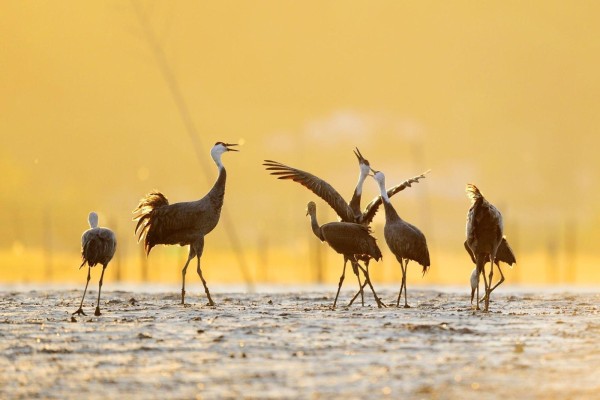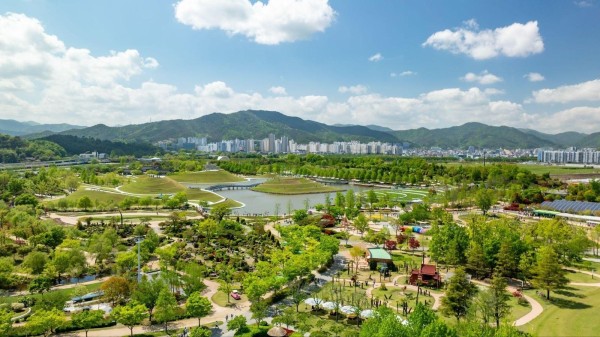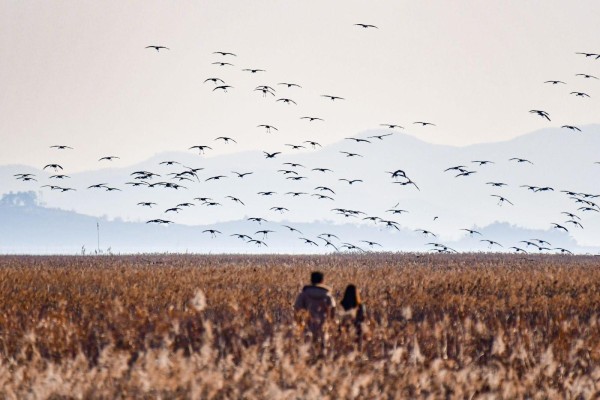Suncheon has emerged as South Korea’s “Ecological Capital,” joining the world’s conservation leaders with a vision that unites environmental restoration and healing tourism.
Suncheon, Korea South, 30th Oct 2025 – Suncheon’s wetlands revival is drawing global attention as migratory birds return in record numbers to what was once a threatened coastal marsh. Once at risk of disappearing, Suncheonman Bay now stands as a model for ecological restoration, transforming from reclaimed land into South Korea’s “Ecological Capital.” The city’s dramatic turnaround, marked by the return of flocks of hooded cranes gliding over the golden reeds each autumn, showcases how policy, community effort, and environmental vision can create harmony between people and nature.

(Image: Flocks of hooded cranes descend over the golden reeds of Suncheonman Bay. Each autumn, the wetlands turn into a sanctuary for migratory birds—and for visitors seeking to witness one of Asia’s most poetic encounters between nature and life. Photo courtesy of Suncheon City)
Located in South Jeolla Province, Suncheon has redefined urban sustainability by putting nature first. Through bold environmental policy, community collaboration, and global engagement, the city restored its wetlands, revitalised migratory-bird habitats, and positioned itself as both a sanctuary for wildlife and a beacon for healing-centered living.
A Vision Rooted in Restoration
In years past, Suncheonman Bay’s tidal flats and reed beds faced pressure from reclamation, infrastructure, and unchecked industrial development. Recognising the ecological and social value of the landscape, local authorities made an extraordinary decision in 2009: they removed power poles and electrical lines that cut across the wetlands to protect the endangered hooded cranes wintering there. That decision, radical at the time, ushered in a broader transformation that would make Suncheon a living laboratory for ecological restoration.
Over subsequent years, the Suncheonman Bay Wetland Reserve became a thriving refuge for migratory birds and biodiversity, a place where tidal rhythms, reed fields, and quiet landscapes sustain life seldom seen in urban-centric cities.
The Garden That Bridges Nature and City
To shield this sensitive environment from urban sprawl, Suncheon created the Suncheonman National Garden, a 1.12-million-square-metre green buffer zone between the city and the protected wetlands. As Korea’s first national garden of this scale, it features ponds, wildflower meadows, walking trails, and viewing platforms, seamlessly connecting urban life to the natural rhythms of the bay.
The garden’s launch was followed by two major international garden expos, in 2013 and 2023, drawing nearly 10 million visitors and demonstrating that environmental preservation and economic vitality need not be oppositional.

(image: Suncheonman National Garden, Suncheon, South Korea. Established as Korea’s first national garden, the 1.12-million-square-meter green space serves as a buffer between the expanding city and the protected Suncheonman Bay wetlands, balancing ecological preservation with urban life. Courtesy of Suncheon City)
From Preservation to Global Leadership
In 2025, Suncheon stepped onto the global conservation stage, becoming the first local government in Korea to join the International Union for Conservation of Nature (IUCN). At the World Conservation Congress in Abu Dhabi, Mayor Roh Kwan-kyu described the city’s approach:
“We have learned to live not just alongside nature, but in trust with it,” he said. “Suncheon’s experience will become a bridge between ecology and healing for the world.”
The mayor emphasised that this is not a theoretical ideal but a practiced reality within Suncheon.
A New Vision: Healing Through Nature

(image: Flocks of hooded cranes descend over the golden reeds of Suncheonman Bay. Each autumn, the wetlands turn into a sanctuary for migratory birds—and for visitors seeking to witness one of Asia’s most poetic encounters between nature and life. Courtesy of Suncheon City)
Suncheon’s ambitions now reach beyond conservation. The city is cultivating a new paradigm of healing tourism, anchored in its natural and cultural assets. The plan invites visitors to meditate by tidal flats, walk barefoot through reeds, listen to the whisper of grasses, and rediscover balance through sound, food, and stillness. Nearby cultural jewels such as Songgwangsa Temple and Seonamsa Temple are woven into this experience, linking Korea’s spiritual heritage to ecological wellness.
In an era where wellness has become a commercialized pursuit, Suncheon offers something rarely found: the quiet restoration that only nature provides.
A Living Testament to Coexistence
As flocks of hooded cranes descend each autumn over the golden reeds of Suncheonman Bay, the wetlands transform into a sanctuary: for birds, for biodiversity, and for humans seeking refuge from the frenetic pace of modern life. Suncheon stands as a living testament to what cities can become: places that heal rather than harm, where the path to well-being begins not in clinics or spas, but in the wind, the soil, and the shared breath of all living things.
This article was written with the sponsorship of Suncheon City.
Media Contact
Organization: Public Relations Office – City of Suncheon
Contact Person: S.J Kwon
Website: https://www.suncheon.go.kr/tour/
Email: Send Email
City: Suncheon
Country:Korea South
Release id:36335
The post Suncheon Joins Global Conservation Leaders as South Korea’s “Ecological Capital” Redefines Healing Through Nature appeared first on King Newswire. This content is provided by a third-party source.. King Newswire makes no warranties or representations in connection with it. King Newswire is a press release distribution agency and does not endorse or verify the claims made in this release. If you have any complaints or copyright concerns related to this article, please contact the company listed in the ‘Media Contact’ section
Disclaimer: The views, suggestions, and opinions expressed here are the sole responsibility of the experts. No Finance Droid journalist was involved in the writing and production of this article.
